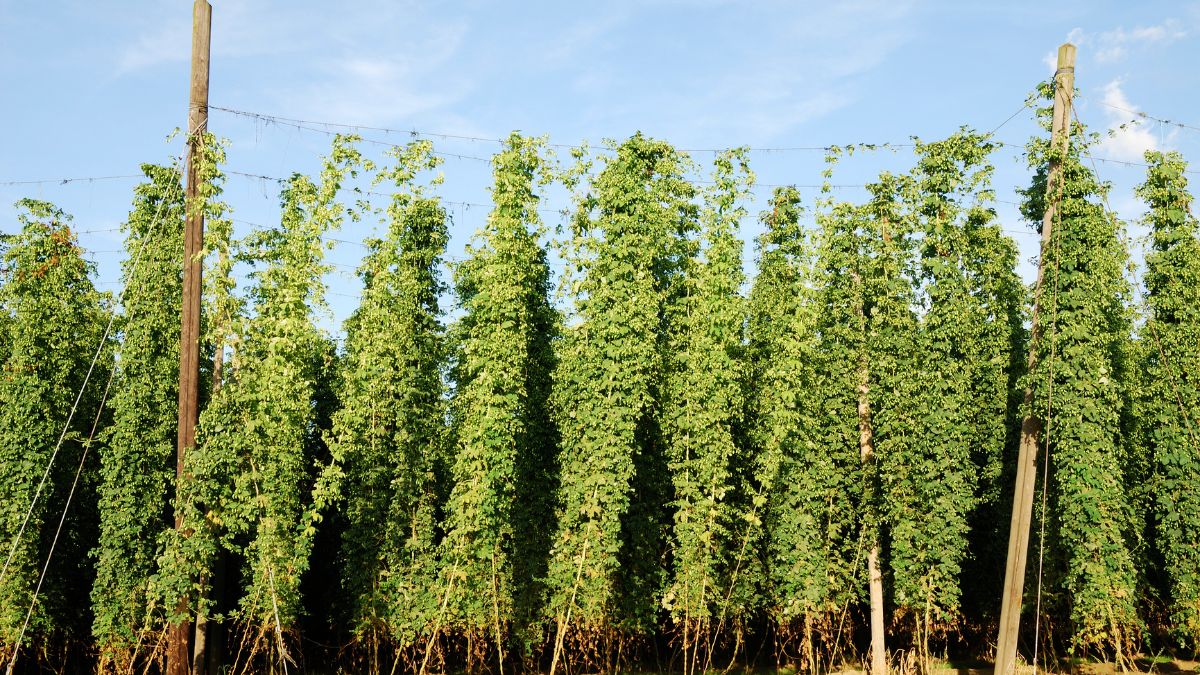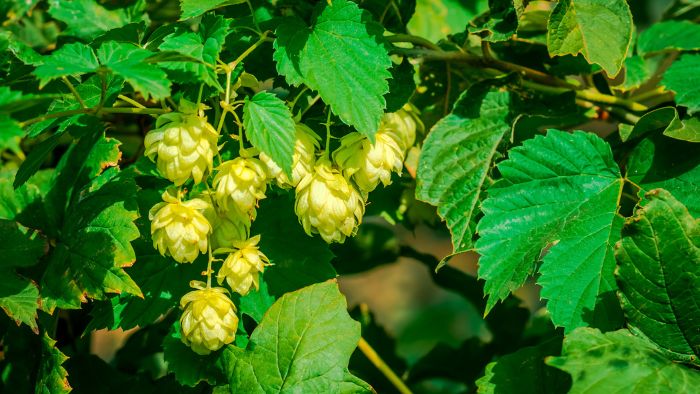What is the Best Soil for Growing Hops? In this blog post, we furnish you with information about these beneficial plants. Whether you are new to the concept of gardening or have a fair knowledge of its demands, the tips and strategies in this article will be of great benefit to you.
Being self-sufficient in this day and age is vital. Growing your own hops is advantageous as it is a culture followed by many homeowners throughout the US. Hops are often used as an ingredient in beer making. If you get to know the demands of your plant and learn how to maintain them, you can look forward to a thriving garden.
In the information below, we let you in on a little history about your plant, what soil is best for them, how to grow them, and a few care tips to keep them healthy and happy. Have a quick look at the information below before you start planting.
What To Consider Before Growing Hops Plants?
Growing hops plants are easy to do if you have the right information; however, when doing so, there are a few things that you should take into consideration. Firstly, these are dioecious plants that fit into two categories. These include male and female plants that are independent.
While the male plant is responsible for pollination, the female plant is the producer of flowers. These blooms are used in the brewing of beer. These hardy perennial blooms are the reason for the signature characteristics found in beer. The flavor, smell, and bitter taste of beer are owed to the female hops plant.
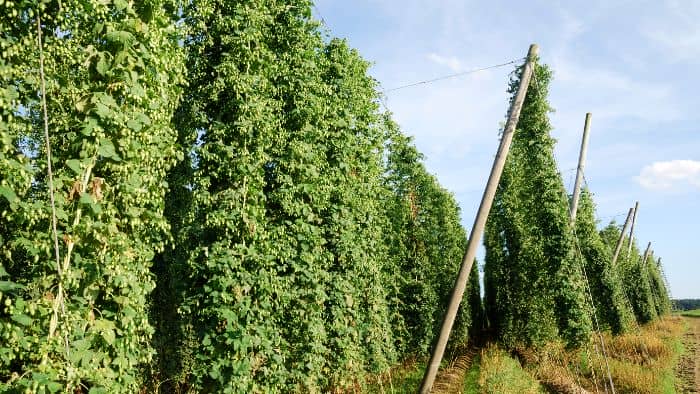
Aside from that, hops plants are anti-microbial agents. This means that it has properties that are used in the preservation of beer. These plants can be grown from roots that are removed from their main stem or from the crown which includes an entire plant.
Keep in mind that there are also more than 100 varieties of the hops plant that you can choose to grow in your garden. However, using the best soil for growing hops is the key to an abundant harvest.
What Is The Best Soil For Growing Hops?
So, you want to grow these plants but have no idea about what is the best soil for hops. For this reason, we have gathered the best information when it comes to soil types for this plant. Firstly, let’s start with a fun fact! Did you know that European settlers used wild hops to brew their beer in the 16th century?
Thereafter, in the early 17th century, these plants were introduced to America by settlers. This is when the plants were interbred, creating the cluster variety that had a distinct taste. The rhizomes moved along with the settlers, hence the production periods in Michigan, Wisconsin, Washington, Oregon, and California.
Today, these plants are grown by homeowners and avid gardeners throughout the US. The best soil for growing hops is loamy soil which is loose and porous and has exceptional draining properties. These plants thrive in soil that is slightly acidic or alkaline so a pH between 6.0 and 7.5 is ideal.
You can also add equal parts of sand, compost, and wood ash to enhance drainage, reduce acidity, and ensure an abundant nutrient supply. Click on this link to learn how to grow hops in your home garden.
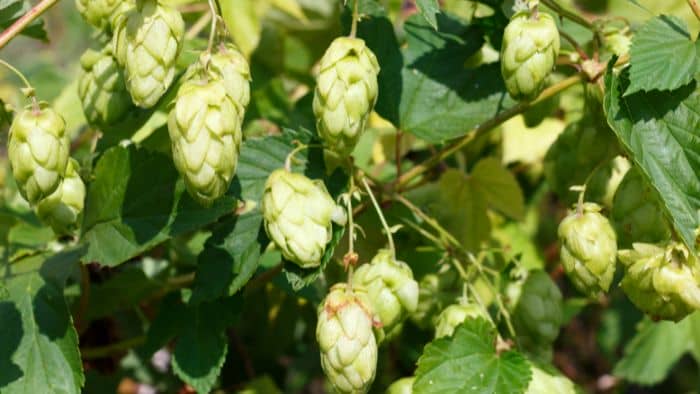
Hops Planting Method
Hops are easy to plant and grow; however, there is a method to ensure that they reach their full potential. These plants take about a year to fully establish the root and crown system and are unlikely to bear any cones during this time. But patience is key when growing them as hops plants offer an abundant harvest once they reach maturity.
It is also vital to understand that once your plants reach maturity, pruning the roots in early spring is essential. This is to stop the spread of rhizomes which can restrict the supply of water and nutrients if not dealt with. For the best yield, cutting back most of the bines is recommended after the first year of growth. Have a look below for an easy planting method.
Growing Hops From Shoots:
- Firstly, you would need to dig a hole that is at least a foot deep before you plant.
- Ensure that you add enough compost to the soil before planting. This will enhance soil nutrients that will be easily available to your hops plant.
- To the soil, you should also add a mixture of plant roots and fungi that are known as mycorrhizal inoculum. This symbiosis is vital for root growth and nutrient uptake.
- After the soil preparation, you can now start planting. Add about five to six rhizomes to each pit. Ensure that they are planted two or three inches below the surface of the soil.
- It is important that your plant the shoots in an upward direction.
- Cover the shoots with the remaining soil and a shovel full of compost. It is also recommended that you add mulch which will protect your hops plant against harsh frosts and weeds.
- Using a fertilizer that has an equal nutrient content of potassium, phosphorus, and nitrogen after the first sprout is advantageous. Thereafter, a continued addition of fertilizer after three to four weeks and before blooming would be ideal.
Hops Plant Care – Common Pests And Diseases
Hops are hardy plants and are therefore a great addition to any garden. Aside from using the best soil growing hops, identifying pest infestations and diseases will help you maintain your plant properly. As with all plants, hops are also prone to certain diseases. If left untreated, your plant will eventually die.
Listed below are the common types of diseases and pest infestations that affect these plants. Timeaously attacking the problem will afford you abundant yields year after year.
Pest and Diseases:
- Powdery Mildew – This disease is quite common in hops plants and is caused by a fungus. It is important to monitor the leaves, stems, cones, and buds of your plant a look out for powdery white colonies. If the disease is at an advanced stage, then the cones that are affected would change to a reddish-brown color. To rid the plant of the fungus, it is best to remove the flawed leaves and buds.
- Downy Mildew – This disease is also caused by a fungus. The tell-tale sign of the infection manifests themselves in the plant’s shoots. These shoots will appear visually flawed as their growth will be stunted and the stems will appear much lighter in color. The plant buds also turn brown when this happens. Therefore, it is best to cut back the infected areas of the plant to rid of the disease and encourage new growth.
- Verticillium Wilt – This plant disease is caused by a combination of two different funguses. One is lethal and can kill your plant while the other is a mild treatable infection. If your plant begins to wilt rapidly then it probably has a lethal strain of the fungus. However, yellowing of the plant leaves is a mild strain that can be treated successfully by removing the flawed stems and leaves.
- Spider Mites – This is the most common pest that affects hops plants. A small army of mites usually causes the leaves to turn a brownish color. However, a severe infestation will leave a trail of white webs that can damage your plant. The best way to rid them is to use insecticidal soaps and treatments.
- Prevention – To prevent these outbreaks, proper maintenance and care is important. This can be achieved by ensuring that your plants grow in an environment that will easily ward off pests and diseases. You can also seek advice from your local nursery to ensure that your plant is getting the best care to thrive.
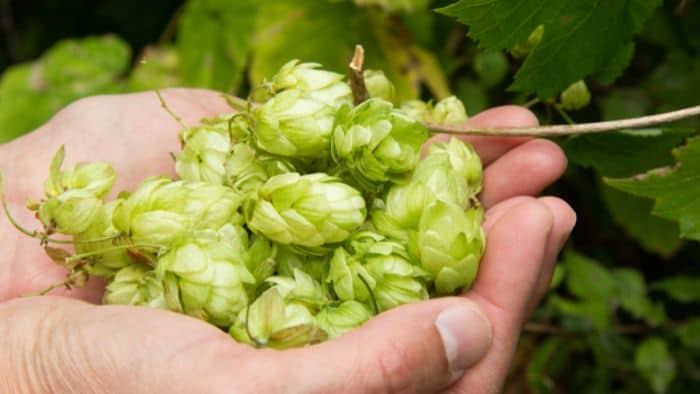
Conclusion
Growing hops plants are easy, especially when they are grown in the correct environment. Although they are hardy plants that are fuss-free, it doesn’t mean that they should be neglected.
This will afford you the best yields through the growing seasons. These plants can grow and live for up to 50 years depending on the maintenance and care they receive. Keep in mind that they need quite a lot of climbing space to reach their full potential. They also need filtered sunlight for at least 6 hours daily.
Also, it is recommended that you use string to support the bines as these plants grow in a clockwise motion. Have a look at this video to find out more about this magnificent beery plant. Home-brewing would be a breeze if you have your own hops garden!
FAQs
[rank_math_rich_snippet id=”s-4cd8b06c-de10-4d5d-86ce-4dbab18334de”]

